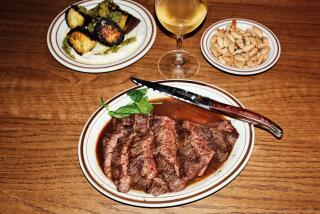Kinko’s Photocopying Shops Thrive on Students, Late-Night Customers
- Share via
It’s 3 a.m. and the cool winds blowing across the San Fernando Valley send chills down your spine. You cruise along the empty boulevards, past a 7-Eleven, a Denny’s, a gas station--but you’re looking for something else.
You’ve got photocopying to do.
Fortunately, Kinko’s on Burbank Boulevard in Van Nuys is ready. It’s the only photocopying shop in the Valley that’s open all day and all night every day. Its late-night customers include owl-eyed rock composers, insomniac job-hunters who want to redo their resumes and college students on allnighters.
Late-Night Regulars
“Our customers would go crazy if we weren’t open all night,” said Harry Johansing, the store’s 25-year-old manager. “There are people who come in every night at 3 or 4 a.m., like clockwork.”
Of the 284 Kinko’s outlets nationwide, only 65--including branches in Huntington Beach, Fullerton and Long Beach--are open 24 hours.
In the Valley, Kinko’s has a Northridge store that is open until 10 p.m. four days a week but plans eventually to be open round-the-clock. There also is a Kinko’s in Woodland Hills that closes at 9 p.m. on weekdays.
The Van Nuys store is fairly typical of Kinko’s outlets in that it is near a college campus, just a few blocks west of Los Angeles Valley College.
In fact, the very first Kinko’s, which opened in 1969 with a $5,000 loan from Bank of America, was next to the campus of the University of California, Santa Barbara, near Kinko’s headquarters.
“We’re sort of a ‘Big Chill’ company,” said Paul Orfalea, 38, founder and chairman of the privately held firm, referring to the 1983 movie about the reunion of people who attended the University of Michigan in the late 1960s.
Orfalea, who studied business and finance at USC, gave the company his nickname, Kinko, which he picked up in college by letting his red hair grow long, curly and kinky. Orfalea opened his first shop during his senior year, which turned out to be a good time to enter the business.
The 1970s and early 1980s were a boom period for the photocopying industry--which now includes about 20,000 stores nationally--because new, better-quality machines took business away from less-efficient offset printers.
Steady Growth
Kinko’s sales have grown at an average of 20% annually since it opened, according to Orfalea, who said 1985 sales were more than $40 million. Kinko’s shops are run as 50-50 partnerships between the company and independent entrepreneurs.
Fast growth hasn’t brought the company fat profits. Orfalea said Kinko’s profit margin is about 2 cents on the dollar, quite low by industry standards. Larry Hunt, former chairman of the Chicago-based National Assn. of Quick Printers, said profits for copy stores average 20% of sales despite the high cost of copying machines.
Hunt said a ream of copy paper, or 500 sheets, costs a store around $2 but brings in $25 with a charge of 5 cents a page. Kinko’s profits may have been kept low, Hunt speculated, by the expense of operating 24-hour-a-day shops.
On the other hand, he conceded, the long operating hours may help Kinko’s draw business from college campuses because students “have weird hours.” Orfalea said 24-hour-a-day shops are good investments, even when business is slow, because they inspire customer loyalty by always being open and by doing overnight jobs.
A Slow Night
The Van Nuys store, which opened in 1974, had one of those slow nights last week. George Gaddie, a 22-year-old Kinko’s employee, kept busy cleaning photocopiers and completing overnight copy orders. Typically, he said, customers straggle in about every half hour.
At about 3:40 a.m., as Gaddie copied newspaper articles about the Philippines while listening to rock music, the lone customer was Conrad Gleich. The manager of a reggae band called Uptown Allstars, Gleich stacked piles of photocopied press releases for the band’s coming appearances.
“I’m up past my bedtime,” said Gleich, 33, who wears his frizzy hair in a ponytail. But he said he often works into the night because the quiet helps him to concentrate.
More than an hour after Gleich left, the next customer arrived, wearing a blue velour running suit. Laurie Beattie, 22, a sales representative for McNeil Consumer Products, the Johnson & Johnson subsidiary that makes Tylenol, was working late on a special project.
Beattie was preparing for a 9:30 a.m. presentation to pharmaceutical wholesalers titled “Tylenol--A Solid Comeback,” aimed at easing fears over recent discoveries of tainted Tylenol capsules.
Beattie asked Gaddie to make 500 copies of an advertisement that ran in newspapers for distribution to drugstores, explaining how customers may exchange Tylenol capsules for the company’s new, coated caplets.
Beattie said she has been making late-night trips to Kinko’s for years, beginning as a student at Arizona State University. “I work odd hours, I guess,” she said. “But then again, I don’t think anyone should dictate when I work and when I sleep.”
More to Read
Inside the business of entertainment
The Wide Shot brings you news, analysis and insights on everything from streaming wars to production — and what it all means for the future.
You may occasionally receive promotional content from the Los Angeles Times.










